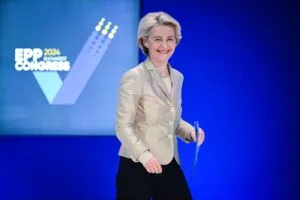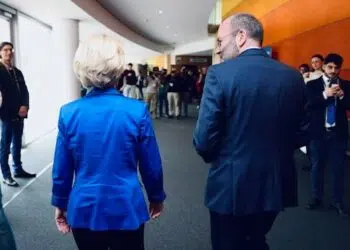Brussels – It was Ursula von der Leyen in campaign gear who spoke today (March 7) in her new capacity as Spitzenkandidatin of the European People’s Party (EPP) at the Bucharest Congress. “There is no doubt what is at stake in this election. Our peaceful and united Europe is being challenged like never before by populists, nationalists, and demagogues, whether it’s the far right or the far left,” the current President of the European Commission and candidate for the EPP-affiliated parties in the June 6-9 elections said, speaking of a new term at the Commission, after the official nomination today at the Bucharest Congress with 400 votes in favor and 89 against.

No surprises about the nomination — considering the fact that von der Leyen was the only candidate in the running and supported by virtually all national party leaders — but what was most striking in Bucharest was the vehemence and vigor with which the German politician listed the priorities of the EPP’s campaign toward the June vote. Starting with the European People’s Party’s red lines for post-election alliances. “Whether it’s the AfD, or Rassemblement National, Konfederacja, or Vazrazhdane, the names may be different, but the goal is the same,” von der Leyen attacked, “They want to trample on our values and they want to destroy our Europe and we, the EPP, will never let that happen.” The Populars remain determined on their three pillars, “pro-EU, pro-Ukraine, pro-Rule of Law,” and from here future interlocutions for a majority in the European Parliament and for the choice of the name for the presidency of the next Commission by the 27 heads of state and government at the European Council can be grafted. Whether it is a matter of renewing the understanding with social democrats and liberals or seeking new ways forward with European conservatives led by Giorgia Meloni, as von der Leyen explained two weeks ago, “Those who defend democracy against the eurosceptics, those who defend our values, those who are against Putin’s friends, these are the ones I want to work with and with whom I know I can work.”
The chairwoman of the European Commission – as of today also doubling as the Spitzenkadidatin of the EPP in the 2024 Europeans – also used the same resolute tones to list the priorities of the European political family of the Populars for the election campaign, drawing a change of course on the two main pillars of the von der Leyen cabinet in office since 2019: Green Deal and migration. “Unlike others, we stand for pragmatic and not ideological solutions on the European Green Deal,” the joint candidate of the EPP said, implicitly harking back to rhetoric now widely rooted in the European right against the former Socialist vice-president of the EU Commission, Frans Timmermans: “We in the EPP know that there is no competitive economy without climate protection and no climate protection without a competitive economy” and at the same time “we were the first to design the Green Deal in a social, industrial, and economical way.” Speaking of the Migration and Asylum Pact nearing completion, von der Leyen instead insisted that “we have strengthened Europe’s borders and will continue to do so,” reinforcing the new narrative that “it is we Europeans who decide who comes to Europe and under what circumstances, not criminal trafficking organizations.”
A focus of von der Leyen’s speech was inevitably on farmers given the wave of protests across member countries and the Union for the past two months. “I want to be very clear, the EPP will always be on the side of our farmers,” in particular to “bring back sustainability” to a food system where “sometimes they are forced to sell milk, meat, and wheat below production costs. This is totally unacceptable,” because “our food security depends on the security of the living conditions of our farmers.” On the defense front – just two days after the presentation of the new European strategy for the near future – the Spitzenkadidatin of the EPP reiterated that “Europe must spend more, better, and in a European way” in the defense sector and that “there is an urgent need to rebuild and modernize the European armed forces.” Should she be re-elected as president of the EU Commission, von der Leyen explained that “we need a commissioner-designate for defense for the next term,” also considering that “we will be the party that will deliver the defense union.” Finally, speaking of European security, the passage on Ukraine and Russia was decisive: “Navalny sacrificed himself to save the country, Putin sacrificed the country to save himself,” but “he will not be able to destroy the dream of a free and prosperous Ukraine that takes a place at the heart of the European Union.” While this dream “lives on also in Moldova, Georgia, and the Western Balkans,” for Putin, however, “there is a court in The Hague waiting for him.”
Von der Leyen and the other Spitzenkandidaten at the 2024 European
In the 2024 European elections, von der Leyen will challenge the Spitzenkandidaten already appointed to head the other European political families. The European Socialist Party (ESDP) confirmed the current European Commissioner for Labor and Social Rights, Luxembourg’s Nicolas Schmit, at the Rome Congress on March 2. The European Greens chose Germany’s Terry Reintke and the Dutch Bas Eickhout at the Lyon Congress on February 2-4. The Left chose Austria’s Walter Baier at the Ljubljana Congress on Feb. 23-24. The plans of the liberals of Renew Europe are still unclear in this regard.
The Spitzenkandidat (Spitzenkandidatin in the feminine) figure was first introduced for the 2014 European elections, in the wake of the increased powers that the EU Parliament was given in the Lisbon Treaty – signed in 2007 and entered into force in 2009 – and which MEPs wanted to interpret as broadly as possible. Parties wanted to get closer to voters, who always saw the Commission as a body distant from the lives of citizens but with broad powers to affect their lives. Naming a person means making sure that voters can get to know them before taking up an important post, and, at the same time, it is also a chance for the parties to implicitly suggest who they would like to prevent – even internally – from being chosen after the elections.
Parties do not formally designate the President of the Commission, nor does the European Parliament. Based on the Lisbon Treaty, this power lies with the governments, meeting in the European Council, who choose the person to lead the Commission. The name is proposed to the European Parliament, which has the power to approve or not approve the choice. In essence, it is a shared power between an institution that chooses and one that approves. That is why it is possible to solve the potential short circuit between the Council and Parliament by introducing a Spitzenkandidat: only on the strictly political level because legally, the indication by the parties before the elections has no value. In addition, no group in the European Parliament – under current conditions and likely also after the June elections – has the strength to choose the President of the Commission on its own. The choice, therefore, is the result of an agreement between different political forces and national governments.
English version by the Translation Service of Withub






